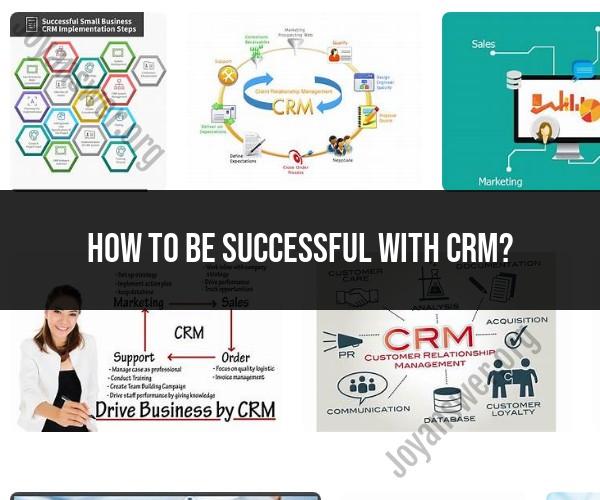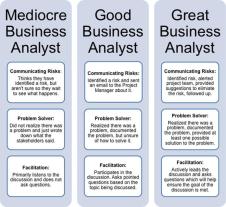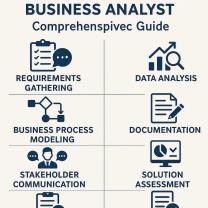How to be successful with CRM?
Achieving success with Customer Relationship Management (CRM) involves not only selecting the right CRM software but also implementing it effectively to meet your business goals and enhance customer relationships. Here are strategies for successful CRM implementation:
Define Clear Objectives:
- Begin by setting clear and specific objectives for your CRM implementation. Identify what you want to achieve, whether it's improving customer service, increasing sales, or enhancing marketing efforts.
Involve Key Stakeholders:
- Engage stakeholders from various departments, including sales, marketing, customer service, and IT. Their input and buy-in are critical for a successful CRM project.
Select the Right CRM Solution:
- Choose a CRM software that aligns with your business needs and objectives. Consider factors like scalability, ease of use, customization options, and integration capabilities.
Customize and Configure:
- Customize the CRM to match your business processes. Configure workflows, fields, and reports to align with your specific requirements. Avoid overcomplicating the system with unnecessary customizations.
Data Management and Quality:
- Ensure data accuracy and consistency by establishing data management protocols. Cleanse and migrate existing data into the CRM, and implement data validation rules to maintain data quality.
User Training and Adoption:
- Provide comprehensive training to all users to ensure they can effectively use the CRM system. Training should cover basic functionalities, data entry, and advanced features.
Effective Change Management:
- Implement a change management strategy to help employees transition to the new CRM. Communicate changes, address concerns, and provide ongoing support and resources.
Data Integration:
- Integrate the CRM with other systems, such as email platforms, marketing automation tools, and ERP systems, to ensure seamless data flow and accessibility.
Testing and Quality Assurance:
- Conduct thorough testing of the CRM system to identify and address any issues or bugs. Perform functionality testing, security testing, and user acceptance testing.
Data Security and Compliance:
- Ensure that the CRM system complies with data security and privacy regulations relevant to your business. Implement security measures to protect sensitive customer data.
Pilot Implementation:
- Roll out the CRM on a smaller scale as a pilot project before a full-scale deployment. This allows you to identify and resolve any issues before widespread adoption.
Feedback and Continuous Improvement:
- Encourage feedback from users and stakeholders. Use this feedback to make continuous improvements to the CRM system, addressing pain points and optimizing processes.
Key Performance Indicators (KPIs):
- Define KPIs that align with your CRM objectives. Regularly measure and report on these metrics to assess the impact of your CRM implementation.
User Support and Resources:
- Provide ongoing support, resources, and documentation to help users troubleshoot issues and maximize their use of the CRM system.
Regular Maintenance and Updates:
- Schedule regular system maintenance and updates to keep the CRM software and infrastructure up to date and secure.
Executive Leadership and Sponsorship:
- Secure executive leadership and sponsorship for the CRM project to ensure continued support and resources.
Celebrate Successes:
- Celebrate milestones and successes achieved through CRM implementation. Recognize and reward teams and individuals who contribute to its success.
Strategic Alignment:
- Continuously align CRM efforts with your overall business strategy to ensure that it remains a valuable asset to your organization.
Success with CRM is an ongoing journey that requires commitment, collaboration, and a focus on delivering value to both your organization and your customers. Regularly assess your CRM's impact on your business, make necessary adjustments, and adapt to evolving customer needs and industry trends.
Achieving Success with CRM: Strategies for Effective Implementation
Here are some strategies for effective CRM implementation:
- Define your goals and objectives. What do you want to achieve with your CRM system? Once you have a clear understanding of your goals and objectives, you can start to develop a plan to achieve them.
- Choose the right CRM solution. There are a variety of CRM solutions available on the market. Take some time to research different solutions and compare their features and pricing. Make sure to choose a solution that meets the specific needs of your business.
- Get buy-in from all stakeholders. It is important to get buy-in from all stakeholders early in the CRM implementation process. This will help to ensure that everyone is on the same page and that the project has the support it needs to be successful.
- Involve your team in the planning process. Your team members will be the ones using the CRM system on a daily basis, so it is important to involve them in the planning process. This will help to ensure that the system is easy to use and that it meets their needs.
- Provide training to your users. Once the CRM system is implemented, you need to train your users on how to use it. This will help to ensure that they are able to get the most out of the system.
- Monitor and evaluate the system. Once the CRM system is in place, it is important to monitor and evaluate its performance. This will help you to identify any areas where the system can be improved.
Maximizing Customer Relationship Management for Business Success
CRM can help businesses to achieve success in a number of ways, including:
- Improved customer satisfaction: CRM can help businesses to improve customer satisfaction by providing them with a better understanding of their customers' needs and preferences. This information can then be used to provide customers with more personalized and relevant experiences.
- Increased sales: CRM can help businesses to increase sales by providing them with the tools and insights they need to nurture leads and close more deals.
- Reduced costs: CRM can help businesses to reduce costs by automating tasks and streamlining processes. This can free up employees to focus on more important tasks, such as building relationships with customers.
- Improved decision-making: CRM can help businesses to improve decision-making by providing them with insights into customer behavior and market trends. This information can be used to make more informed decisions about product development, marketing, and sales.
Measuring ROI and Success Metrics for CRM Initiatives
To measure the ROI and success of your CRM initiatives, you need to track the following metrics:
- Customer satisfaction: This can be measured using surveys, customer feedback forms, and Net Promoter Score (NPS).
- Sales: This can be measured by tracking the number of leads generated, the number of deals closed, and the total revenue generated.
- Costs: This can be measured by tracking the costs associated with CRM software, training, and support.
- Decision-making: This can be measured by tracking the number of decisions made based on CRM data and the impact of those decisions on the business.
By tracking these metrics, you can get a better understanding of how your CRM initiatives are performing and whether they are achieving your desired results.
In conclusion, CRM can be a powerful tool for businesses of all sizes. By following the strategies and tips outlined above, you can increase your chances of success with CRM and achieve your business goals.











